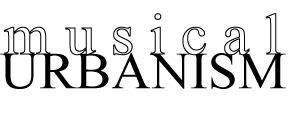I set up a personal Twitter account, @LeonardNevarez, to accompany my original @MusicalUrbanism account. In explaining why, this is a good moment to review the evolution of my Musical Urbanism project.
In the fall of 2007, I introduced a new co-taught course, Musical Urbanism, as a senior seminar at Vassar College’s Urban Studies Program. The goal of the course was to explore urban cultural analysis using popular music as a case study. This was an entirely new field of study for me, although my interests in cities and music go way back. I found the topic so exciting that my co-instructor Heesok Chang (from Vassar’s English Department) and I taught the course again the following fall. Then, after a two-year hiatus I taught it again in the spring of 2011 with a new co-instructor, Hua Hsu (also from Vassar’s English Department, and a rather active music writer himself). If all goes well, Hua and I have plans to offer Musical Urbanism in the spring of 2015.
By the time Hua Hsu joined me in teaching the course, my interests in this project expanded to include (1) a new blog, Musical Urbanism, for my original writing, and (2) a @MusicalUrbanism Twitter account. The latter has always been curatorial in its objective, a site for me to link and comment upon online news, writing and scholarship that somehow fit within the domain of “Musical Urbanism.” Twitter seemed an appropriate forum for such an activity because it centralized a lot of the music writing in publications which I was already reading, and because so many music writers (a community that I had new interest in) have taken to Twitter as a forum to share ideas and opinions.
The narrow focus of @MusicalUrbanism also provided a helpful set of constraints on my tweeting. While I’m an avid Facebook user and am interested intellectually and pedagogically in social media (e.g., as a member of Vassar’s Committee on Academic Technologies), I was a newby to Twitter. Frankly, I didn’t trust myself not to voice insensitive opinions about someone’s favorite band, and I didn’t want to tweet ad nauseum in a way that might dilute the focus of my @MusicalUrbanism content. Again, this was a very new project, so it seemed useful to reserve the medium of Twitter for this rather focused domain.
In the three years since I set up @MusicalUrbanism, I’ve attracted a decent number of followers interested in the content I was tweeting — music fans and writers, as well as academics from sympathetic fields like ethnomusicology and cultural geography. As these things happen, I started following a number of scholars working in fields closer to my non-musical interests (urban political economy, neoliberalism, the sociology of work, etc.) and vice versa. I also discovered how convenient Twitter is to aggregating content of all kinds — for instance, local Hudson Valley news and blogs. Increasingly I’ve wanted to participate in the various conversations in these other communities, but again I’ve hesitated to dive in for going ‘off message.’
One of Twitter’s real value-addeds for scholars comes with tweeting at academic conferences. In this regard, my experience at the EMP/IASPM’s 2012 Pop Conference was a real eye-opener. Not only was it the first time I presented some work from my Musical Urbanism project, but I found it really exciting to hear about the many sessions’ presentations via the tweets of audience members. No one had really done this at conferences I had attended in the past, at least so far as I knew, so I enthusiastically joined in. Of course, tweets from a pop music conference with the theme “Sounds of the City” were entirely in keeping with the usual @MusicalUrbanism fare, which the addition of an #emp2012 hashtag did little to alter.
Then I tweeted at the American Sociological Association meetings in the summer of 2012 and 2013. The first time, I noticed only a trickle of #asa2012 tweets, growing into a wider albeit still inexhaustive stream by #asa2013. (I don’t know why sociologists have been slow to adopt conference tweeting as a practice; just today I noticed the ASA tweeted “ten tips” on the subject.) Now I had begun to redirect @MusicalUrbanism purposefully off topic, if only for a few days, and I realized my Twitter handle was holding me back from a second value of conference tweeting: identifying yourself to other conference twerps.
The long and the short of it is that, for these and other reasons, I’ve set up the @LeonardNevarez account for the kind of multiple-interest, multiple-role tweeting that most people are used to seeing on Twitter. The focused curatorial objective of @MusicalUrbanism will continue. Meanwhile, you’ll start to notice some of my other interests in sociology, on Hudson Valley news (local/regional developments being of intrinsic interest to urban sociologists), and the occasional viral RT. No doubt you’ll see music tweets too, now unshackled from the intersection with urban studies.

1 comment
timothy says:
Jan 25, 2014
Just two, I have 4 lol :-)